
BY SONAL S LADVA
ANAHEIM, CA - The Servite High School Auditorium filled up by over 300 people who walked in to watch a comedy and walked out learning the ‘lessons of life’ through the mindful Gujarati Comedy Play ‘102 Not Out!’ Learning how to live life to the fullest with enthusiasm, integrity, dignity,
ANAHEIM, CA - The Servite High School Auditorium filled up by over 300 people who walked in to watch a comedy and walked out learning the ‘lessons of life’ through the mindful Gujarati Comedy Play ‘102 Not Out!’ Learning how to live life to the fullest with enthusiasm, integrity, dignity,
self-reliance and detachment is the central theme of ‘102 Not Out!’ Written and directed by Saumya Joshi, it is the story of a dad aged 102 going on 26 who teaches his 75 year old widowed son lessons on dealing with serious life challenges in an anecdotal and matter of fact manner. Actor Jayesh More (31) plays the role of the 102-year Dad who threatens to send his 75-year-old son, actor Prem Gadhvi (also in the 30’s) to a senior living facility unless he promises to mend his morbid ways of living.
The issue of elderly family members living at home versus being cared for by paid professionals in senior living facilities has been brewing within the Indian community since the rise of individualistic pursuits. The humor displayed here reflects in the reversal of roles where in a senior wants to send his junior to a senior living facility which by far is an expensive posh place, thus breaking the glass on an old peoples home being a place of punishment rather than a flourishing community filled with luxuries.
This follows a series of step up conditions that need to be fulfilled by the son, Babu Vakharia to allow him continual occupancy rights in his familial home. A contract drawn up by the Dad is then signed off by the son and a witness named Dhiru. Dhiru’s character played by Himen Trivedi, is that of the fading quintessential ‘Kirana’ delivery boy in Mumbai that played an important role in the lives of people in the 60’s through now by alleviating loneliness through gossip or a silent listener for the homebound individual – in this case both, Dad and Son. The conditions all border around bringing Babu back to life by having him blow a conch shell, listen to his favorite songs, giving up daily visits to the doctor, reliving pleasant memories of his dead wife by touring the love spots with Dhiru as caretaker, and forming a bond with him while on this journey down memory lane.
Saumya Joshi skillfully uses Dhiru to debunk the myth of ‘blood is thicker than water’. The connection that is formed between Babu and Dhiru replaces and vanquishes the yearning for a UK bound son Amol who for the past Seventeen years is playing hide and seek with his Dad Babu here. The challenge of the empty nest syndrome faced by Indian parents when Children move Seven seas away is subtly touched upon here. Tied to this we also see another crucial lesson of ‘abandonment’, which was brought to life by the Gujarati saying ‘Chhoru Kachorru Thay, Mavtar Kamavtar Na Thay’ – meaning that a child could turn a rogue towards the parent, but parents could never do the same with their offspring. Dad J. Vakharia encourages son Babu to respond to abandonment by detachment. To not hold on to things, memories, emotions to the extent that it debilitates you in life. Babu plays this out by abandoning his son Amol and removes his name as a beneficiary of any familial property inheritance. The motto being ‘We are alive till not dead and hence should not die while we live.’
Another highlight of the play was minimalism showcased in the simplicity of props used for the house, costumes and minor decorative pieces. Joshi is known for this and it compels the audiences to focus on the subject matter to be conveyed as opposed to the distractive and grandiose outlays we see in the theater. Soon to be made into a movie casting Big B as the 102 year Dad and the Powerful Paresh Rawal as the 75-year-old boring son, ‘102 Not Out!’ is highly recommended for audiences of all ages.
In an exclusive interview with India Journal, actors Jayesh More, Prem Gadhvi and Himen Trivedi stated that the show has had over 400 performances spanning over four years with the same actors! More stated that the reason for this loyalty to the script and play is living the challenge of looking into the future of a character that is way ahead of their chronological ages.
The play was brought to Los Angeles by Amrita Dodani and hosted by the well-known Shah Foundation and Tisha Entertainment.
During the intermission Babubhai Patel of Neema Sari, appealed to the audiences to donate toward the recent Baroda floods. They promised to send all collected cash and clothes to the flood affected areas at their own expense. By the closing they had succeeded in collecting $2000 cash with a silent donor pledging to triple the match.
The issue of elderly family members living at home versus being cared for by paid professionals in senior living facilities has been brewing within the Indian community since the rise of individualistic pursuits. The humor displayed here reflects in the reversal of roles where in a senior wants to send his junior to a senior living facility which by far is an expensive posh place, thus breaking the glass on an old peoples home being a place of punishment rather than a flourishing community filled with luxuries.
This follows a series of step up conditions that need to be fulfilled by the son, Babu Vakharia to allow him continual occupancy rights in his familial home. A contract drawn up by the Dad is then signed off by the son and a witness named Dhiru. Dhiru’s character played by Himen Trivedi, is that of the fading quintessential ‘Kirana’ delivery boy in Mumbai that played an important role in the lives of people in the 60’s through now by alleviating loneliness through gossip or a silent listener for the homebound individual – in this case both, Dad and Son. The conditions all border around bringing Babu back to life by having him blow a conch shell, listen to his favorite songs, giving up daily visits to the doctor, reliving pleasant memories of his dead wife by touring the love spots with Dhiru as caretaker, and forming a bond with him while on this journey down memory lane.
Saumya Joshi skillfully uses Dhiru to debunk the myth of ‘blood is thicker than water’. The connection that is formed between Babu and Dhiru replaces and vanquishes the yearning for a UK bound son Amol who for the past Seventeen years is playing hide and seek with his Dad Babu here. The challenge of the empty nest syndrome faced by Indian parents when Children move Seven seas away is subtly touched upon here. Tied to this we also see another crucial lesson of ‘abandonment’, which was brought to life by the Gujarati saying ‘Chhoru Kachorru Thay, Mavtar Kamavtar Na Thay’ – meaning that a child could turn a rogue towards the parent, but parents could never do the same with their offspring. Dad J. Vakharia encourages son Babu to respond to abandonment by detachment. To not hold on to things, memories, emotions to the extent that it debilitates you in life. Babu plays this out by abandoning his son Amol and removes his name as a beneficiary of any familial property inheritance. The motto being ‘We are alive till not dead and hence should not die while we live.’
Another highlight of the play was minimalism showcased in the simplicity of props used for the house, costumes and minor decorative pieces. Joshi is known for this and it compels the audiences to focus on the subject matter to be conveyed as opposed to the distractive and grandiose outlays we see in the theater. Soon to be made into a movie casting Big B as the 102 year Dad and the Powerful Paresh Rawal as the 75-year-old boring son, ‘102 Not Out!’ is highly recommended for audiences of all ages.
In an exclusive interview with India Journal, actors Jayesh More, Prem Gadhvi and Himen Trivedi stated that the show has had over 400 performances spanning over four years with the same actors! More stated that the reason for this loyalty to the script and play is living the challenge of looking into the future of a character that is way ahead of their chronological ages.
The play was brought to Los Angeles by Amrita Dodani and hosted by the well-known Shah Foundation and Tisha Entertainment.
During the intermission Babubhai Patel of Neema Sari, appealed to the audiences to donate toward the recent Baroda floods. They promised to send all collected cash and clothes to the flood affected areas at their own expense. By the closing they had succeeded in collecting $2000 cash with a silent donor pledging to triple the match.

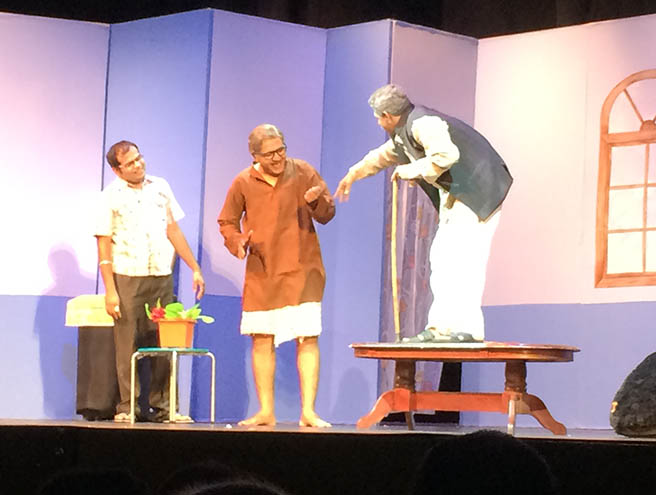
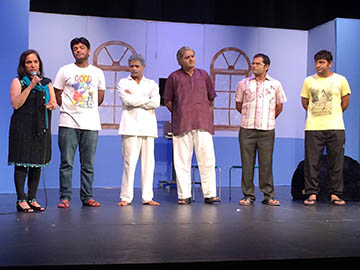
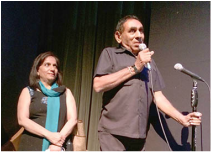
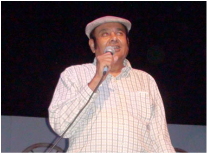
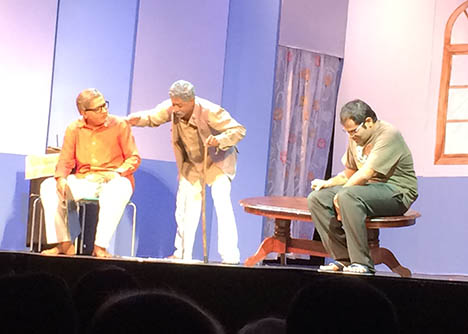
 RSS Feed
RSS Feed
